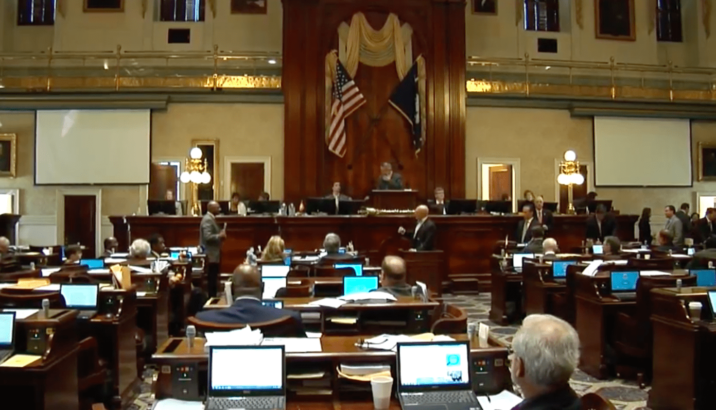South Carolina State Representative Alan Clemmons, a real estate attorney who has been called “Israel’s biggest supporter in a U.S. state legislature,” tells Representatives that his bill won’t interfere with free speech. Many experts disagree.
South Carolina is poised to be the first state to pass legislation to adopt an Israel-centric definition for “anti-Semitism.” This will then apply to the state’s campuses, potentially limiting discussion of Israel-Palestine to one-sided information that fosters U.S. policies that provide Israel $10 million per day. The bill has been heralded in Israel as a “a landmark bill” that will lead change across the U.S. and the world.
By Alison Weir
The South Carolina Senate has recently passed legislation that changes the definition of anti-Semitism to include criticism of Israel, and then applies this new definition to college campuses in a manner that experts say will impede free academic inquiry. The U.S. gives Israel over $10 million per day, and Congress frequently approves increases to that amount; restricting discussion on this issue could serve to bolster and increase these expenditures.
The legislation codifies a definition of anti-Semitism that significantly changes the meaning of the word, and it requires the state’s colleges to use this new definition when determining whether an action is “discriminatory” and therefore prohibited. This new definition declares statements that are critical of Israel—even when factual—“anti-Semitic” and therefore impermissible.
A bill on this passed in the state House of Representatives, but when promoters failed to pass it in the state Senate, they resorted to a parliamentary maneuver that may have broken their own rules. They inserted the text at the last minute in South Carolina’s 545-page General Appropriations bill, which is considered a “must-pass” bill because it is required for state government to function. The insertion is on page 348, sandwiched between a section on “Statewide Higher Education Repair and Renovation” and a section that specifies the amount of money appropriated to one of the state’s colleges.
Since the inserted text (section 11.22) does not appear germane to the bill in which it was inserted (and was ruled out of order on the first attempt to add it), the maneuver may have broken legislative rules.*
However, it appears unlikely that the sponsors will be held to account, for two reasons: 1. In Israel the bill is considered extremely important, and some powerful organizations both in the U.S. and internationally support it. 2. However, in South Carolina, legislators tend to consider it insignificant legislation that will have little, if any, impact and therefore see no reason to expend political capital in questioning it. (More on this below.)
Not Law Yet
While pro-Israel groups are celebrating the passage as a “monumental” victory, there are actually two more steps before it becomes state law.
First, the bill must be reconciled with a previous appropriations bill passed by the House. This bill also contains an amendment redefining anti-Semitism and applying it to colleges, but uses different wording. Representatives of the two chambers will meet in the next week or so to create a compromise bill. After that has been accomplished, the Governor must sign it into law.
It is safe to assume neither of these steps will constitute obstacles, however. The governor is in an 8-candidate gubernatorial race where campaign donations are critical, and examination of campaign finance records indicate that pro-Israel donors, often from out of state, frequently play an outsized role in such elections. If history is any predictor, neither he nor any challengers are likely to oppose the legislation.
The Law Will Have Major Impact
The inserted legislation does several things:
First, it vastly expands the traditional, very clear meaning of anti-Semitism—hostility to or prejudice against Jewish people on the basis of their being Jewish—to a new definition that includes certain types of information about Israel.
The Senate bill spells out a long, hazy definition that consists of an array of types of actions, “certain perceptions,” “rhetorical manifestation,” etc., that would now legally constitute “anti-Semitism.” Half a dozen of them are related to the modern state of Israel.
The House bill, rather than spelling out the definition itself, codifies a definition adopted by a State Department special envoy in 2010, which also changed the traditional meaning of anti-Semitism to include statements critical of Israel. (Full text of both are below.)
The Senate bill requires South Carolina’s Commission on Higher Education to print copies of this new, Israel-centric definition of anti-Semitism and distribute them to all South Carolina public colleges and universities.
Finally, both bills mandate that academic institutions use this definition in deciding whether someone has violated a school’s policy prohibiting discrimination.
If the legislation goes through and becomes law, as proponents appear certain it will, the consequences could be two-fold: a significant loss of academic freedom at South Carolina colleges, and, indirectly, continued one-sided U.S. Middle East policies and massive expenditures.
But first let’s look at the historic and geopolitical background of this new definition.
Origin of the New Definition
The basic outline of this new, Israel-centric definition of anti-Semitism was first created by an Israeli minister in 2004. Israel partisans have successfully pushed its adoption by numerous entities around the world ever since, building on even the smallest endorsements to create momentum and a snowballing effect. (See this for details.)
In the U.S., a two-step process has achieved partial success in getting the nation to legally adopt the new definition, but the effort is ongoing—South Carolina’s law would be a major step forward for proponents of the definition, and the accompanying censorship of certain types of information.
The first step that would enable the adoption of the definition in the U.S. also occurred in 2004: Pro-Israel groups successfully promoted federal legislation to create a “special envoy” and State Department office to monitor anti-Semitism. This was done over the objections of state department officials, who said it was unnecessary.
The second step was accomplished by one of these envoys, who unilaterally adopted the new, Israel-centric definition in 2009. (All three envoys have been demonstrably pro-Israel, two later working for the Israel lobbying organization AIPAC—the American Israel Political Action Committee. President Trump, as part of his general cost-cutting measures, has not yet appointed a new envoy, causing many pro-Israel groups to call him anti-Semitic for this failure.)
Anti-Semitism Special Envoy Hannah Rosenthal (above) adopted the Israel-centric definition in 2009.
Since that time, Israel partisans have introduced legislation in the federal government and state legislatures—and even on some college campuses—to adopt this definition, which they call the “state department definition.” South Carolina, if the bill becomes state law, will be their first success in this effort.
Curtailing Freedom of Speech and Academic Inquiry
These bills usually contain a final sentence that says they don’t violate the Constitutional guarantee of free speech, and their sponsors make this claim to the people voting for them.
However, the reality seems to be the opposite.
Legal experts say the legislation will do just that, and there is a history of university administrators around the country censoring protected speech on the basis of such definitions.
In fact, the author of the definition adopted by the State Department anti-Semitism envoy has vehemently opposed legislating the definition into law, specifically writing that applying it to colleges “is a direct affront to academic freedom.”
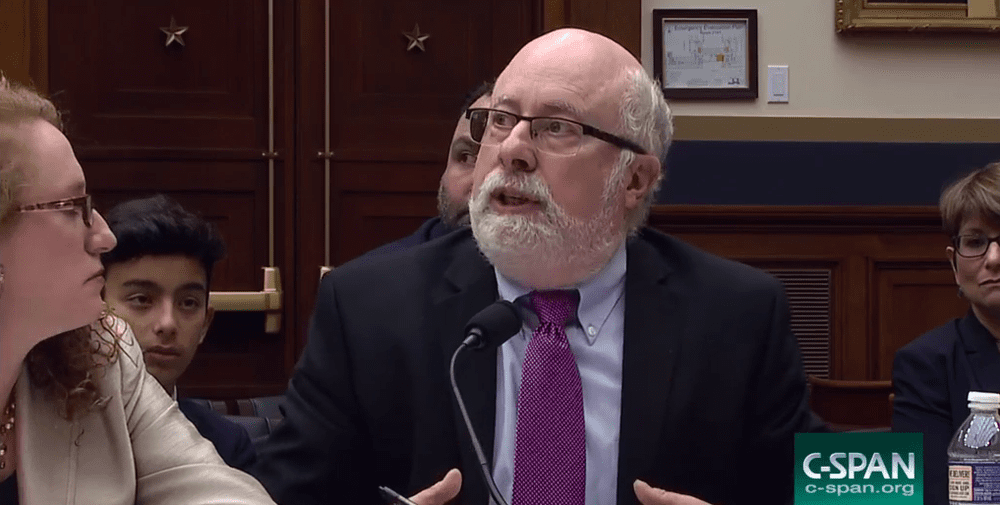
In a letter opposing federal legislation to codify the definition as law, author Kenneth Stern stated: “The definition was never intended to be used to limit speech on college campuses; it was written for European data collectors to have a guide for what to include and what to exclude in their reports.”
Stern, the American Jewish Committee’s expert on anti-Semitism for 25 years, opposed incorporating the definition into law in a way that he called “unconstitutional and unwise.” Stern warned that this would “actually harm Jewish students and have a toxic effect on the academy.”
Other legal experts agree with Stern.
An analysis by the Center for Constitutional Rights and other groups that examined the proposed federal bill (not yet passed) found that not only would it interfere with freedom of speech, but that such censorship was the motivation for the legislation: “The Act purports to address rising anti-Semitism on college campuses, but a close reading reveals that its true purpose is to silence campus advocacy for Palestinian rights and censor any criticism of Israeli government policies.”
The document continues: “This vague and overbroad re-definition conflates political criticism of Israel with anti-Semitism, infringing on constitutionally protected speech.”
Finally, the paper specifically emphasizes: “The re-definition is especially detrimental to universities, where freedom of speech, critical inquiry, and unfettered debate are integral.”
The American Civil Liberties Union (ACLU) also actively opposes such legislation, stating that the federal bill poses “a serious threat to the First Amendment free speech rights of those on campus who may hold certain political views.”
In its letter of opposition to the federal bill, the ACLU stated: “The First Amendment prevents the federal government from using its great weight to impose severe penalties on a person simply for sharing a political viewpoint critical of Israel.”
The chief of staff of the ACLU’s legislative office in Washington said that the legislation “opens the door to considering anti-Israel political statements and activities as possible grounds for civil rights investigations.”
How the Law Will Limit Free Speech in South Carolina

An examination of the South Carolina situation indicates how the new law could play out.
University of South Carolina guidelines contain the laudable statement that “all students should be able to learn and live” in an environment that is “free from discrimination … in all programs, activities, and services of the University.”
Since the new legislation defines many statements about Israel, no matter how factual, as “anti-Semitic” and therefore constituting discrimination, Israel partisans can be expected to invoke the law: to prevent public speakers from discussing information on Palestine, to prevent professors from educating students fully and accurately on the Middle East, and/or to punish professors or students who provide facts that Israel and its partisans don’t wish students to know. Anti-Palestinian activists have invoked the definition to accomplish all of these things elsewhere, in a number of instances.
In addition, the legislation could interfere with student groups’ ability to bring speakers to campus. While student groups are normally allowed to use student fees to bring outside speakers, under the new legislation this could change. While students could bring pro-Israel speakers without problems, groups wishing to bring speakers with different perspectives might not have an equal ability to do so. Ironically, a bill that many of its supporters intended to be against discrimination, might actually create discrimination against certain students, including those from ethnic or religious minorities.
By blocking such speakers and information, the “free marketplace of ideas” would be severely limited on South Carolina campuses when it comes to Israel-Palestine—one of the most significant issues in today’s world, a critical factor in Middle East wars, and the core issue of the Middle East.
For decades, the U.S. has given Israel far more of our tax money than to other nation (on average, 7,000 times more per capita than to other people), as well as massive diplomatic cover. Most of the rest of the world therefore considers the U.S. as the sponsor responsible for Israel’s actions. Therefore, it is particularly crucial that Americans be fully informed on Israel and its actions. No one, including the most committed supporter of Israel, benefits from one-sided, incomplete information. Friends don’t let friends bury their heads in misinformation while supporting ethnic cleansing.
“Momentous” Breakthrough
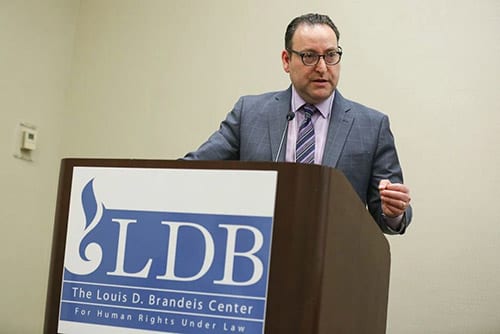
Pro-Israel groups, both international and domestic, have been watching—and participating in—the South Carolina situation with great eagerness. Now that South Carolina seems poised to adopt the “anti-Semitism” legislation, many hope that “as goes South Carolina, so goes the nation”—and the world.
Israel’s Jerusalem Post newspaper called the South Carolina legislation “a landmark bill that is set to be the model for states across America and countries around the world.”
The pro-Israel Brandeis Center, which helped promote the legislation, declared: “Just as two dozen states followed South Carolina’s lead on legislation condemning the movement to boycott certain countries [Israel], we are hoping this momentous step will result in another national wave to, once and for all, begin defeating rising anti-Semitism.” Anti-Semitism, that is, defined to include many forms of criticism of Israel.
Supporters of these bills claim their efforts are necessary to battle rising anti-Semitism. Therefore, it is important to realize and scrutinize what they mean by “anti-Semitism.”
The much-cited Anti-Defamation League (ADL) and another group, AMCHA, classify many actions in support of international law and Palestinian human rights as supposedly “anti-Semitism.” Both organizations actively advocate for Israel. The ADL, which is often perceived as a civil rights organization, has been connected to some initiatives promoting Islamophobia, and it produced a campus guide describing how to block events about Palestine.
Despite what the legislation’s supporters would have us believe, a 2017 report found that Jewish students “reported feeling comfortable on their campuses, and, more specifically, comfortable as Jews on their campuses.” Fewer than 10 percent of the students articulated the belief that anti-Israel sentiment is anti-Semitism. Even some Israel partisans have said that reports of alleged anti-Semitism on campuses are inaccurate.
Barry Trachtenberg, who teaches in the Jewish Studies Department at Wake Forest University, said it was a “factual distortion” to call colleges “hotbeds” of anti-Semitism, and said that that criticism of Israel is part of healthy academic debate.
“Students who engage in speech critical of Israeli policy are largely motivated by their concern for Palestinian human rights,” Trachtenberg said. “They are not motivated by anti-Semitic hate, but its opposite — a desire to end racial and religious discrimination of all kinds.”
The reality is that students who support Israel are extraordinarily well supported on American campuses. There are over two dozen organizations that collectively contribute millions of dollars to campaigns to promote Israel on campuses. Casino magnate Sheldon Adelson reportedly has raised at least $20 million to quash student speech critical of Israeli policies. Sheldon, who has said he wished he had served in the Israeli military rather than in the U.S. army, has created a task force that funds pro-Israel students to organize events on campuses, with the funding per campus reportedly in the six figures per year on at least forty campuses.
Israel has long recognized the need to promote its interests on campuses. The Israeli minister who created the original formulation for the new anti-Semitism definition said that college campuses were “one of the most important battlefields” for Israel.
An Israel lobby leader announced some years ago, after student government at U.C. Berkeley considered taking some measures to boycott Israel: “We’re going to make certain that pro-Israel students take over the student government. That is how AIPAC operates in our nation’s capitol. This is how AIPAC must operate on our nation’s campuses.”
Organizations & individuals behind the bill
A number of pro-Israel organizations took credit for helping on South Carolina’s anti-Semitism legislation.
The Brandeis Center, named after former Supreme Court Justice Louis Brandeis (who for a period headed the world Zionist movement) announced that its representatives “testified at multiple South Carolina hearings on the bill and have been working closely with state legislators to ensure passage.”
Another group that helped promote the bill was the Israel Allies Foundation. Its U.S. executive director Joseph Sabag stated: “The IAF was honored to help lead the advocacy and surrounding educational efforts, as well as provided policy and legal resources to legislators for this effort.”

IAF is a multi-million dollar international organization that promotes Israel around the world. Sabag explained that the mission of IAF, “via its 37 pro-Israel Caucuses worldwide, and in the U.S. Congress and state legislatures, is to provide policymakers with the resources they need to craft sound public policy.” IAF particularly works to create support for Israel among Christians, putting on events at churches and other venues throughout the United States.
Sabag said that the Israel Allies Foundation “couldn’t be prouder of what’s been accomplished here in South Carolina.”
UPDATE: Information came out in 2020 that Israel Allies Foundation received money from the Israeli government and may have acted in ways that violate U.S. laws.
The Israel Project, with a budget of about $8 million, is another organization that helped on the legislation. Founded 16 years ago to support Israel, The Israel Project focuses on “informing the media and public conversation about Israel and the Middle East.” Its website proclaims that it “is the only organization dedicated to changing people’s minds about Israel through cutting-edge strategic communications. We don’t attack the media, we become a trusted partner and resource.”
Israel Project President Josh Block (annual salary half a million dollars) praised South Carolina: “South Carolina was the first state to pass anti-BDS legislation and now has become the first state in the nation to pass uniform definition of anti-Semitism legislation.” (BDS—boycott, divestment, sanctions—is an economic campaign to pressure Israel to end its violations of international law, U.S. law, and human rights.).
The Brandeis Center also credited CUFI (Christians United for Israel) and StandWithUs for their help on the legislation.
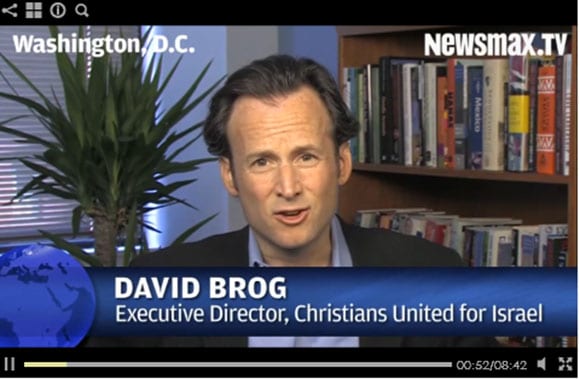
Founded in 2006, CUFI claims to have 3-4 million “members,” though this seems to actually be the number of emails the organization has gathered; the number of active supporters may be closer to 30,000 to 50,000. CUFI lobbies on behalf of Israel and disseminates pro-Israel spin on diverse issues to Americans and Canadians.
Charisma News reports: “It’s no secret that one of the most powerful lobbying groups in Washington, D.C., the American Israel Public Affairs Committee (AIPAC), has long wanted a ‘Gentile arm,’ and some believe they now have it in CUFI.”
While CUFI’s head is megachurch pastor and celebrity John Hagee, its executive director and co-founder David Brog may be the organization’s real mover and shaker. According to Charisma News, “Brog is the powerhouse behind the Christian organization, yet he’s also a conservative (non-Messianic) Jew.” The article reports: “Brog, who was chief of staff to liberal Sen. Arlen Specter of Pennsylvania for seven years, is said to run CUFI like a political campaign. He has talking points, stays focused and rallies his constituency.” Prime Minister Ehud Barak is his cousin.
Stand With Us is an international organization supporting Israel headquartered in Los Angeles that works in the U.S., Canada, Israel, England, South Africa, China, Europe, and Australia. CEO Roz Rothstein commended South Carolina’s legislation, saying: “Just as South Carolina took the lead in passing anti-BDS legislation, we hope that the passage of H3643 will be the first of many states to follow suit.”

The Brandeis Center also credited the Jewish Federations of Columbia and Charleston, South Carolina with helping on the legislation.
Representative Alan Clemmons
The official author of the House bill was Representative Alan Clemmons, known for his Israel advocacy. South Carolina’s Post and Courier newspaper reports that Clemmons is “Israel’s biggest supporter in a U.S. state legislature.”

Clemmons, a Mormon, has traveled to Israel four times, met with Prime Minister Netanyahu, sometimes leads South Carolina delegations to Israel, and was a drafter of the 2016 national Republican Party platform on Israel, parts of which have been adopted by the Trump administration. In 2017 Clemmons joined U.S. Ambassador to the U.N. and former South Carolina Governor Nikki Haley at special U.N. event sponsored by the World Jewish Congress.
Clemmons sometimes meets with extremist Israeli settlers (Israeli settlements are illegal under international law), and calls them his “great tutors” on the issue of Israel-Palestine. (But Clemons ignores the statements of religious leaders such as Dead Sea scholar Millar Burrows, Naturei Karta rabbis, and the American Council on Judaism, who have long opposed Israeli confiscation of Palestinian land.)

There is no record of Clemmons and his delegations ever traveling to Gaza or the West Bank on independent, fact-finding trips or having unscripted meetings with Palestinian Muslims and Christians.
Opposition to the Legislation
A number of South Carolinians objected to the legislation for diverse reasons.

Some argued it could “restrict thoughtful critiques of Israeli policy.” A Palestinian student activist wrote a letter to the editor in which she explained that her group, which included Jewish members, “fully acknowledge and sympathize with the Jewish history, but assert our right to criticize the actions of Israel.”
South Carolina’s State newspaper reported on opponents who testified against the House bill: “Speaking hurriedly to meet a two-minute time limit lawmakers had imposed, they said the bill would discourage college discussions on the Israeli-Palestinian conflict and gag pro-Palestine student groups.”
The paper reported that Caroline Nagel, an associate professor of geography at the University of South Carolina, said she feared that the bill would “silence professors and student groups who are trying to explain and to give voice to a diversity of opinions about the Israeli-Palestinian conflict.”
“I am frankly baffled,” Nagel said, “as to why any legislator would consider an idea to curtail our freedom of speech.”

Some opponents felt that the House members who signed onto it had been “hoodwinked.”
“They just think it’s something that’s nice for Israel,” said David Matos, president of Carolina Peace Resource Center. “They don’t realize it’s a pretty nasty attempt to suppress free speech on college campuses … to suppress debate on college campuses on Israel and Palestine.”
“It’s clearly unconstitutional,” Matos said. “The intent is to suppress political speech and smear it as anti-Semitism.”
Some State Legislators Raise Questions

South Carolina State Senator Brad Hutto held up the Senate bill, leading its sponsors to slip it into the appropriations bill instead. Hutto said: “I have heard not one university trustee that I know come up here and tell me that they were having any problems understanding how to read the dictionary or make up their own mind and needing our help on it.”
The Israel Allies Foundation, angered at Hutto’s action, blasted Hutto, a longtime liberal who calls anti-Semitism “horrible,” for allegedly working “to benefit the forces of bigotry and intolerance.”
In reality, however, Hutto had explained that he would support the legislation if it applied to “all races, ethnicities and gender identities.”
In an interview for this article, Hutto said that he was opposed to the bill for several reasons.
Hutto felt there was no need for the legislation. While he emphasized that “anti-Semitism is a horrible thing,” he pointed out that the universities have an elected board of trustees fully capable of managing any complaints or problems. He said there was no need for the State Assembly to “micromanage conduct on campuses.”
Hutto also disliked that the bill focused on only one type of bigotry, and in only one place. He emphasized that “all bigotry of every kind is bad,” and said “it’s bad everywhere, in housing, at work, everywhere.” Hutto said he might consider supporting a broader bill that made a general statement against all bigotries in all their various forms and locations.
Hutto also felt it was a mistake to inject foreign policy into the state legislature when there are numerous pressing issues in South Carolina that the legislature needs to address.
The bottom line, however, was that Hutto didn’t think the law would have any impact, “other than getting one or two members free trips to Israel.”
For that reason, he said, most Senators considered the legislation unimportant. While some other Senators also opposed the legislation, he said—mostly out of freedom of speech concerns—they didn’t see the need to expend “political capital” on a law that they felt would “do nothing.”
Hutto, focused on South Carolina and the needs of his constituents, seemed surprised that the bill is considered so significant elsewhere.
A few people in the state house also opposed the bill.
One of them, Josiah Magnuson, said in an interview for this article that he supports Israel, but thought that the bill was “probably not the right approach” and was concerned that it might limit free speech. Like Hutto, though, he didn’t think the legislation was important or would do much.

Representative Jonathan Hill, a former sponsor who took his name off the bill, said that he thought it was wrong to apply to U.S. citizens a State Department definition of anti-Semitism intended for use abroad: “It does not necessarily account for the rights of American citizens to free speech. It’s designed for application in a geopolitical context.”
In an interview for this article, Hill noted that the State Department definition “was created for diplomatic purposes, not for use in the U.S.” and was concerned that applying it to colleges “could interfere with the Constitutional rights of Americans.”
Hill emphasized that he finds anti-Semitism “reprehensible,” but is focused on “the most appropriate way to handle the situation.” He said, “I’m not against what Senator Clemmons is trying to accomplish, but I feel that he is going about it the wrong way.”
“The First Amendment is a pretty big deal,” Hill said. “At the end of the day the government can’t start micromanaging the things that you say.”
Jewish Academics Oppose the Legislation
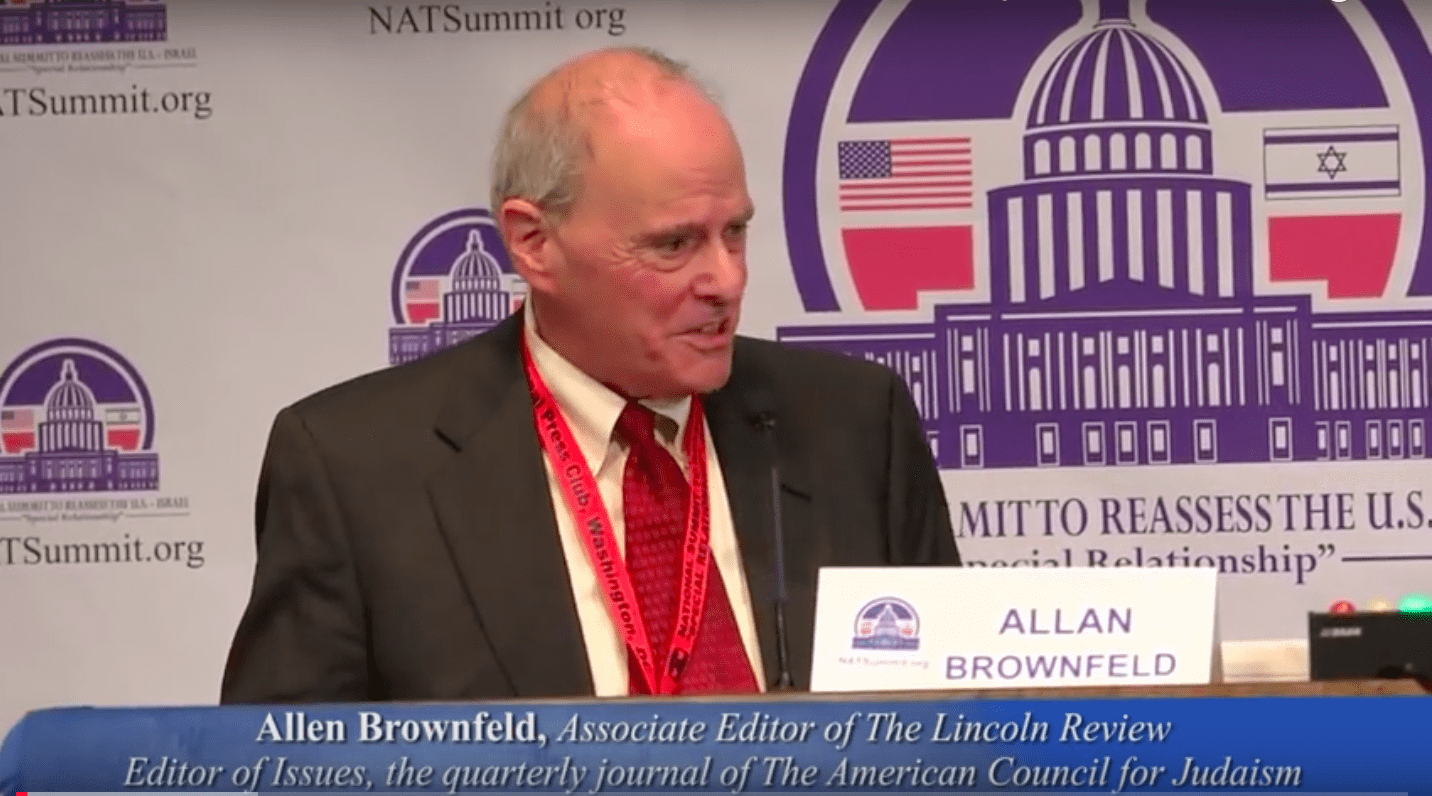
Some Jewish groups and individuals also opposed the new definition and codifying it in federal law or state law.
The American Council on Judaism’s Allan Brownfeld recently wrote: “There is a campaign to redefine anti-Semitism to mean criticism of Israel and opposition to Zionism. This campaign has as its goal the silencing of those who are critical of Israel’s 50-year occupation of Palestinian territories and are engaged in activities such as support for the boycott, divestment and sanctions (BDS) movement.”
Brownfeld concluded: “Real problems must be addressed with real discussion and debate. Only those who have something to lose by open debate would use the tactics we have seen deployed by Israel and its most fervent American supporters.”
Over 60 Jewish scholars signed a letter calling the federal bill “misguided and dangerous.”
Another 300 Jewish students signed a letter objecting that the federal bill conflated “legitimate criticism of the policies of the Israeli government with anti-Semitism, using a problematic definition of anti-Semitism never intended for use on college campuses … At a time when freedom of expression is under threat across the country, we need to be protecting and expanding speech, not restricting it.”
The letter said that such legislation would “limit our freedom of expression around the vital issues of our time.”
Truly a Vital Issue
The issue of Israel-Palestine is particularly relevant right now.
In the last few weeks there has been a massive uprising by men, women, and children in Gaza against the theft of their homes, their virtual imprisonment by Israel, and the decade-long blockade against them that has caused malnutrition among their children and severe hardship for their whole population.
Israeli forces have injured approximately 5,000 of the demonstrators, including a child who was shot in the head. During Easter, Israeli forces blocked hundreds of Palestinian Christians in Gaza from praying at the Church of the Holy Sepulchre in Jerusalem.
These are not pleasant facts to disseminate or to know. Israel partisans may wish to dispute details, and have the right to do so. But the proper way to go about this is with civil, open, fair debate—not by suppressing information, breaking the rules, cheating students of their rights, and violating a Constitution that has served the United States well for over 200 years, as we have striven ever closer to the ideal of equal rights for all.
Allowing a special interest group to censor important information from our country’s students, even for the most benign of motivations, is unfair to our young people, damages our way of government, and causes profound harm to all of us.
Let us hope that South Carolina’s legislators rethink their support for this bill. If they don’t, let us hope that other states don’t follow in a direction that violates some of our nation’s most fundamental principles. Our students and our nation deserve better.
Alison Weir is executive director of If Americans Knew, president of the Council for the National Interest, and author of Against Our Better Judgment: The Hidden History of How the U.S. Was Used to Create Israel.
* The first attempt to insert the text into the Senate appropriations bill, Amendment No. 49, was ruled not germane and ruled out of order. Supporters of the text then came back with Amendment No. 74, which added the requirement that the new definition be printed and distributed. Because this required an expenditure, this time the amendment squeaked through. Both amendments were introduced by Senator Larry Grooms, who had shepherded the bill in the Senate.
House Appropriations bill – 4950
Below is the section about anti-Semitism:
117.149. (GP: Prohibition of Discriminatory Practices) (A) In the current fiscal year and from the funds appropriated to public colleges and universities, when reviewing, investigating, or deciding whether there has been a violation of a college or university policy prohibiting discriminatory practices on the basis of religion, South Carolina public colleges and universities shall take into consideration the definition of anti-Semitism for purposes of determining whether the alleged practice was motivated by anti-Semitic intent.
(B) Nothing in this proviso may be construed to diminish or infringe upon any right protected under the First Amendment to the Constitution of the United States or Section 2, Article I of the South Carolina Constitution, 1895.
(C) For purposes of this proviso, the term ‘definition of anti-Semitism’ includes:
(1) the definition of anti-Semitism set forth by the Special Envoy to Monitor and Combat Anti-Semitism of the Department of State in the fact sheet issued on June 8, 2010; and
(2) the examples set forth under the headings ‘Contemporary Examples of Anti-Semitism’ and ‘What is Anti-Semitism Relative to Israel?’ in the fact sheet.
Senate General Appropriations bill 4950
Below is the text on pages 348-9 of General Appropriations bill 4950 passed by the Senate on April 12, 2018:
11.23. (CHE: Prohibition of Discriminatory Practices) (A) In the current fiscal year and from the funds appropriated to the 16 Commission on Higher Education, the commission shall print and distribute to all South Carolina public colleges and universities 17 the definition of anti-Semitism. 18 (B) For purposes of this proviso, the term “definition of anti-Semitism” includes: 19 (1) a certain perception of Jews, which may be expressed as hatred toward Jews. Rhetorical and physical manifestations 20 of anti-Semitism are directed toward Jewish or non-Jewish individuals and/or their property, toward Jewish community institutions 21 and religious facilities; 22 (2) calling for, aiding, or justifying the killing or harming of Jews; 23 (3) making mendacious, dehumanizing, demonizing, or stereotypical allegations about Jews as such or the power of Jews 24 as a collective; 25 (4) accusing Jews as a people of being responsible for real or imagined wrongdoing committed by a single Jewish person 26 or group, the state of Israel, or even for acts committed by non-Jews; 27 (5) accusing the Jews as a people, or Israel as a state, of inventing or exaggerating the Holocaust; 28 (6) accusing Jewish citizens of being more loyal to Israel, or to the alleged priorities of Jews worldwide, than to the interest 29 of their own nations; 30 (7) using the symbols and images associated with classic anti-Semitism to characterize Israel or Israelis; 31 (8) drawing comparisons of contemporary Israeli policy to that of the Nazis; 32 (9) blaming Israel for all inter-religious or political tensions; 33 (10) applying double standards by requiring of it a behavior not expected or demanded of any other democratic nation; 34 (11) multilateral organizations focusing on Israel only for peace or human rights investigations; and 35 (12) denying the Jewish people their right to self-determination, and denying Israel the right to exist, provided, however, that 36 criticism of Israel similar to that leveled against any other country cannot be regarded as anti-Semitic. SECTION 11 – H030 – COMMISSION ON HIGHER EDUCATION PAGE 349 1 (C) South Carolina public colleges and universities shall take into consideration the definition of anti-Semitism for purposes of 2 determining whether the alleged practice was motivated by anti-Semitic intent when reviewing, investigating, or deciding whether 3 there has been a violation of a college or university policy prohibiting discriminatory practices on the basis of religion. 4 (D) Nothing in this proviso may be construed to diminish or infringe upon any right protected under the First Amendment to the 5 Constitution of the United States or Section 2, Article I of the South Carolina Constitution, 1895.
Below is the earlier bill, that had been held up in the Senate:
South Carolina Bill 3643
TO AMEND THE CODE OF LAWS OF SOUTH CAROLINA, 1976, BY ADDING SECTION 59-101-220 SO AS TO DEFINE CERTAIN TERMS CONCERNING ANTI-SEMITISM, TO PROVIDE INSTITUTIONS OF HIGHER LEARNING IN THIS STATE SHALL CONSIDER THIS DEFINITION WHEN REVIEWING, INVESTIGATING, OR DECIDING WHETHER THERE HAS BEEN A VIOLATION OF AN INSTITUTIONAL POLICY PROHIBITING DISCRIMINATORY PRACTICES ON THE BASIS OF RELIGION, AND TO PROVIDE NOTHING IN THIS ACT MAY BE CONSTRUED TO DIMINISH OR INFRINGE UPON ANY RIGHTS AFFORDED BY THE FIRST AMENDMENT TO THE UNITED STATES CONSTITUTION OR SECTION 2, ARTICLE I OF THE CONSTITUTION OF THIS STATE.
Be it enacted by the General Assembly of the State of South Carolina:
SECTION 1. Article 1, Chapter 101, Title 59 of the 1976 Code is amended by adding:
“Section 59-101-220. (A) For purposes of this section, the term ‘definition of anti-Semitism’ includes:
(1) the definition of anti-Semitism set forth by the Special Envoy to Monitor and Combat Anti-Semitism of the Department of State in the fact sheet issued on June 8, 2010; and
(2) the examples set forth under the headings ‘Contemporary Examples of Anti-Semitism’ and ‘What is Anti-Semitism Relative to Israel?’ in the fact sheet.
(B) In reviewing, investigating, or deciding whether there has been a violation of a college or university policy prohibiting discriminatory practices on the basis of religion, South Carolina public colleges and universities shall take into consideration the definition of anti-Semitism for purposes of determining whether the alleged practice was motivated by anti-Semitic intent.
(C) Nothing in this section may be construed to diminish or infringe upon any right protected under the First Amendment to the Constitution of the United States or Section 2, Article I of the South Carolina Constitution, 1895.”
SECTION 2. This act takes effect upon approval by the Governor.
Our operations are funded solely by generous individuals like you. Your contribution will help us continue shining a light on the Israel/Palestine situation and the U.S. connection.
DONATERelated reading:
International campaign is criminalizing criticism of Israel as ‘antisemitism’
Update: Evidence that U.S. pro-Israel groups may have violated U.S. laws

